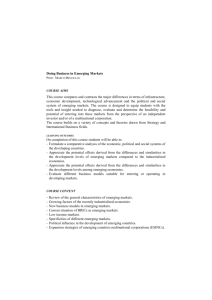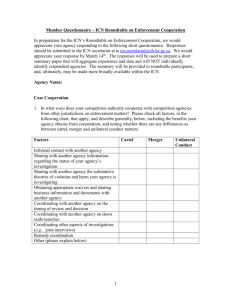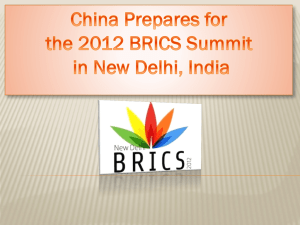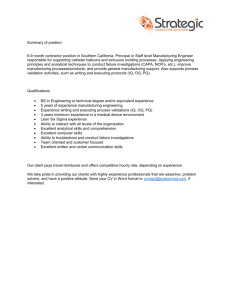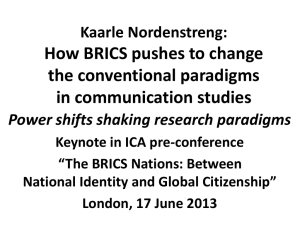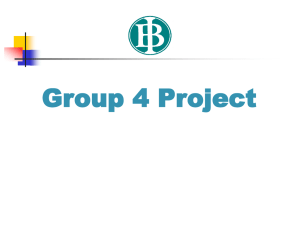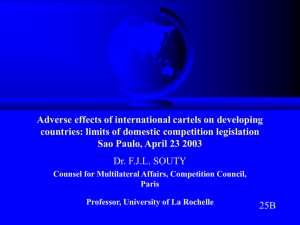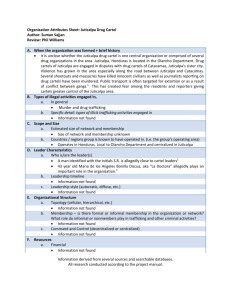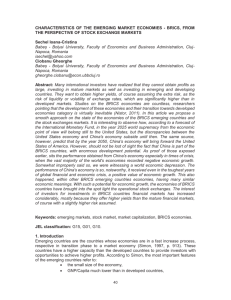DOC - Europa
advertisement
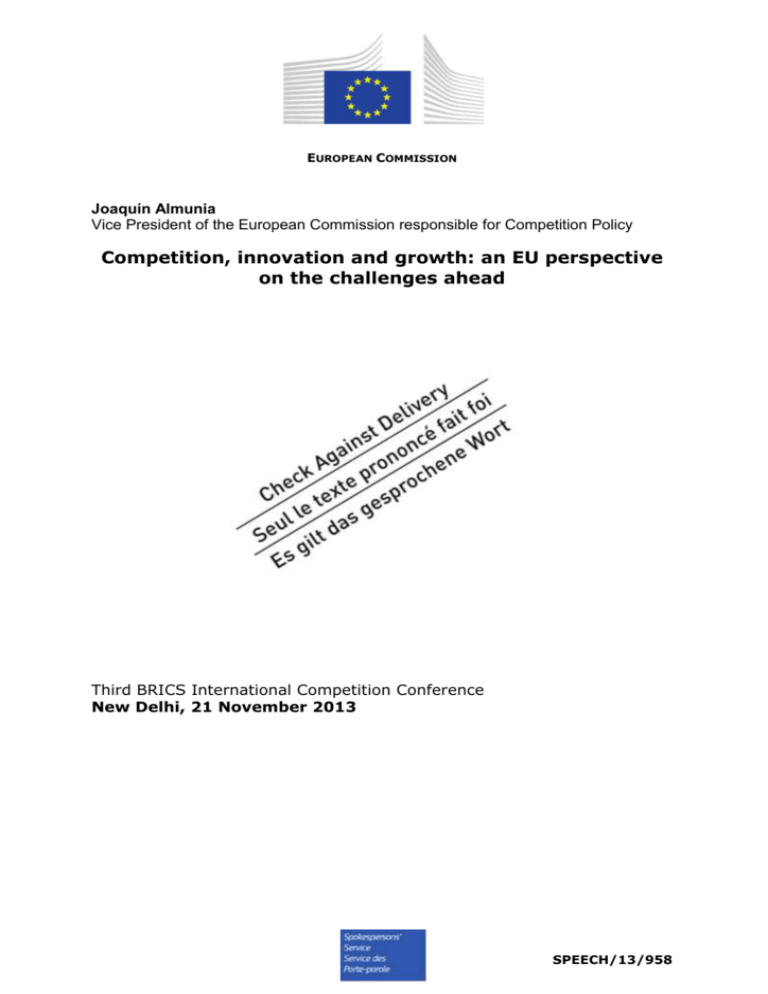
EUROPEAN COMMISSION Joaquín Almunia Vice President of the European Commission responsible for Competition Policy Competition, innovation and growth: an EU perspective on the challenges ahead Third BRICS International Competition Conference New Delhi, 21 November 2013 SPEECH/13/958 Ladies and Gentlemen, It is an honour and a privilege for me to be part of the BRICS International Competition Conference for the first time, and I thank Chairman Chawla for his kind invitation. There are very good reasons for meeting together some representatives of the industrialised countries' Competition authorities and our colleagues from the BRICS. The rise of emerging economies is one of the historical events of our time. For the first time this year, emerging countries will account for more than half of world GDP in purchasing power terms. India, China, Brazil and Russia now rank among the largest ten national economies in the world and South Africa is in the top 30. This process is not about statistics, though. The success of the emerging economies has lifted millions of people out of poverty. At the same time, it also brings benefits to the businesses and people of developed economies. Indeed, the dynamism of emerging economies offers mutual opportunities for growth and welfare; provided we continue to bet on integration, open markets and global cooperation. This three concepts -integration, open markets, and co-operation- also describe well our work as competition authorities – whether we were established a long time ago or more recently. In Europe, competition policy is one of the pillars of the Treaty of Rome of 1957 – at the dawn of European integration. And now, almost six decades later, I think we know how to keep it young in a world that is changing fast. We strive to stay ahead of market developments. We constantly update our policies and investigative tools. And, of course, we continue to engage with our sister agencies around the world – including in emerging jurisdictions – to keep the global playing field as level as possible. The establishment of new competition regimes and agencies is accompanying the rise of new major players in the global economy. I see this as a natural development; consistent with the appearance of new political actors in the multipolar world that is taking shape. 2 Cooperation to tackle common challenges In this changing geo-political setting, it is extremely important that competition enforcers keep their channels of communication open. As business integrates internationally and supply chains span the world, we have more and more challenges in common. We share our goals: we want to protect competition on the merits, foster innovation, and keep markets open and fair. And we know first-hand the benefits of open and fair markets. A solid competition regime and an independent and effective system of enforcement are essential to economic development and to the welfare of our societies – both in developed and emerging jurisdictions. As we fulfill our missions, we must remain indifferent to where the companies we investigate happen to be headquartered. And we must resist pressures to include in our investigations criteria that are not related to competition. Our legitimacy rests on the application of transparent and nondiscriminatory rules. Convergence and the ICN Of course, we operate within different legal frameworks and our rules do not always overlap. But developing a shared understanding of our goals is in everyone’s interest. We should advance towards international standards and promote convergence to minimise the risk of diverging outcomes when we investigate the same cases. Seeking substantive convergence is an important part of the work done in multilateral organisations such as the ICN. Some competition authorities from BRICS countries are quite active in the network. I have fond memories of last year’s ICN annual conference hosted by Brazil’s competition authority in Rio. BRICS agencies are key players to shape the future of competition policy and we look forward to their increased involvement in the ICN together with the other members. Bilateral co-operation Another way of preventing diverging outcomes is sharing our work on individual cases. This has become quite common at the European Commission. During the last years we have worked directly with other competition agencies in many of our major merger and cartel cases. To focus on the latter, nowadays the largest cartels are worldwide and coordinating our investigations across jurisdictions – for instance, by synchronising inspections – is critical for their success. Only a few years ago, our dialogue was limited to some authorities, such as the FTC and the DoJ from the US. But things look different now. On top of our regular contacts with our US colleagues, we have cooperated with authorities in Japan and South Korea in more than 30% of our recent cartel cases. 3 As to the BRICS countries, direct case-related cooperation has been relatively rare so far, but I am convinced that it will become the norm for us. In sum, it is our responsibility to seek – and offer – transparent co-operation during the entire duration of our investigations when they cross the boundaries of our respective jurisdictions. MoU’s To give co-operation a more robust framework for the long term, we have been negotiating a number of bilateral agreements – and the next one will be sealed later today here in New Delhi, where I will have the pleasure to sign a Memorandum of Understanding with the Competition Commission of India. I want to take this opportunity to commend the impressive developments of the CCI, which has laid solid foundations for its future action. I encourage Ashok Chawla and all his staff to continue along the path of efficient and transparent enforcement. Competition and innovation Dear colleagues, Ladies and Gentlemen: As the title of our panel spells out, competition enforcement is essential for innovation and the success of our economies. In the rest of my presentation I will briefly tell you how this applies in the EU. Europe is emerging from five years of crisis. To sustain the recovery, this is the time for public policies to create the best conditions for growth. A large part of the task falls on governments and legislators, of course. Well-designed regulation is essential for a thriving, sustainable and socially responsible economy. But regulation and competition enforcement always go together. In the present juncture, it is important to remind everyone that competition – not protectionism – creates the conditions for investments and innovation. Also, it is more important than ever to punish and deter the anti-competitive practices that put a brake on economic activity. Fighting cartels, the main threat to innovation One such practice is the collusion of established companies to share markets or fix prices. We have been quite active against cartels. For instance, we have several investigations in the automotive sector – an industry that has traditionally been highly innovative – against companies that supply parts to car manufacturers. Earlier this year we imposed fines for €141 million on a number of EU and Japanese producers of cabling systems in cars and we have more cases in the pipeline. But the temptations to set up a cartel seem to be limitless. Our recent decisions have covered a variety of sectors. We have sanctioned cartels that harm end-consumers, such as those involving two big producers of detergents and a group of bathroom equipment manufacturers. We have also uncovered cartels in the markets for air cargo and among freight forwarders, which artificially raise the costs of doing business in Europe. And we have been active in investigating high-tech industries, as shown by our memory chips and LCD cases. 4 At the end of last year we unveiled two cartels in the market for the cathode ray tubes that were once used in TV and computer monitors. Seven international groups of companies had colluded for two decades to keep this dying technology on life support. Of our current cartel investigations, let me also mention those that look into the suspected manipulation of the Libor and Euribor benchmarks. These investigations are advanced and I will soon be able to give fresh news in relation to them. Keeping incumbents in check Another of our priorities is to make sure that incumbents do not keep new competitors away from the market to protect themselves from disruptive and innovative products and business models. A number of cases in this category involve former monopolists trying to preserve their privileges in newly liberalised markets. For instance, in recent years we have taken several decisions in energy markets involving incumbents from France, Belgium, Germany, Italy and lately from Central and Eastern Europe. Other decisions have also involved national incumbents in telecoms markets, notably in Spain, Portugal and Poland. Protecting innovation in new industries Finally, we try to encourage innovation in the new industries that will be the springboard for growth in Europe, especially in the digital industries. Last July we closed our e-Books investigation following commitments from Apple and five of the world’s largest publishers. This case was conducted in close coordination with the DoJ. As to our on-going digital investigations, the most visible one concerns Google, but there are more. For instance, in the summer we inspected the premises of three large European telecoms operators to make sure that the companies are not degrading or slowing down the service offered by other content providers. Two other investigations are linked to what the press calls the ‘smartphone patent wars’ and are about the use and misuse of standard-essential patents. One case involves Motorola, and we are studying the company’s replies to our concerns. In the other, Samsung has already offered commitments. Let me say one final word on merger control, as it also contributes to the promotion of innovation, especially by preserving competitive market structures. Our test for reviewing mergers in the EU is a strict competition test, which focuses on the likely impact of the deal on the market. This is essential if one wants to keep markets truly open to innovative entrants and ultimately competitive in the interest of commercial partners and final consumers. Among the next-to-300 mergers we review each year, only a few pose problems. This year, we blocked two transactions: one between UPS and TNT in the market for parcel deliveries and another between Ryanair and Aer Lingus. But in most cases problematic mergers can be cleared with adequate structural remedies. 5 In today's global economy, many of these deals are reviewed in several jurisdictions. Competition authorities have an important responsibility to ensure optimal and timely coordination. In the interest of investment and growth, we must avoid unnecessary delays for unproblematic transactions and better align the timing of our reviews. And when a proposed transaction raises concerns, it is in our interest to co-operate in a transparent manner, including on possible remedies. Reaching divergent solutions when we review similar issues weakens the credibility of everyone and unduly hampers business conditions. This is one of the main challenges we will be facing in the years to come. Ladies and Gentlemen: Let me conclude by saying that – among all public policies – competition policy is best positioned to show what transparent and effective co-operation can do in the multipolar order that is emerging from the progressive integration of the world economies. Business has already gone global. It would be illogical for us to exercise our control from behind our respective national or – as in the case of the authority I lead – regional fences. Competition authorities, with their tradition of convergence and co-operation, have the opportunity to set an example of global governance for others to follow. Thank you. 6

